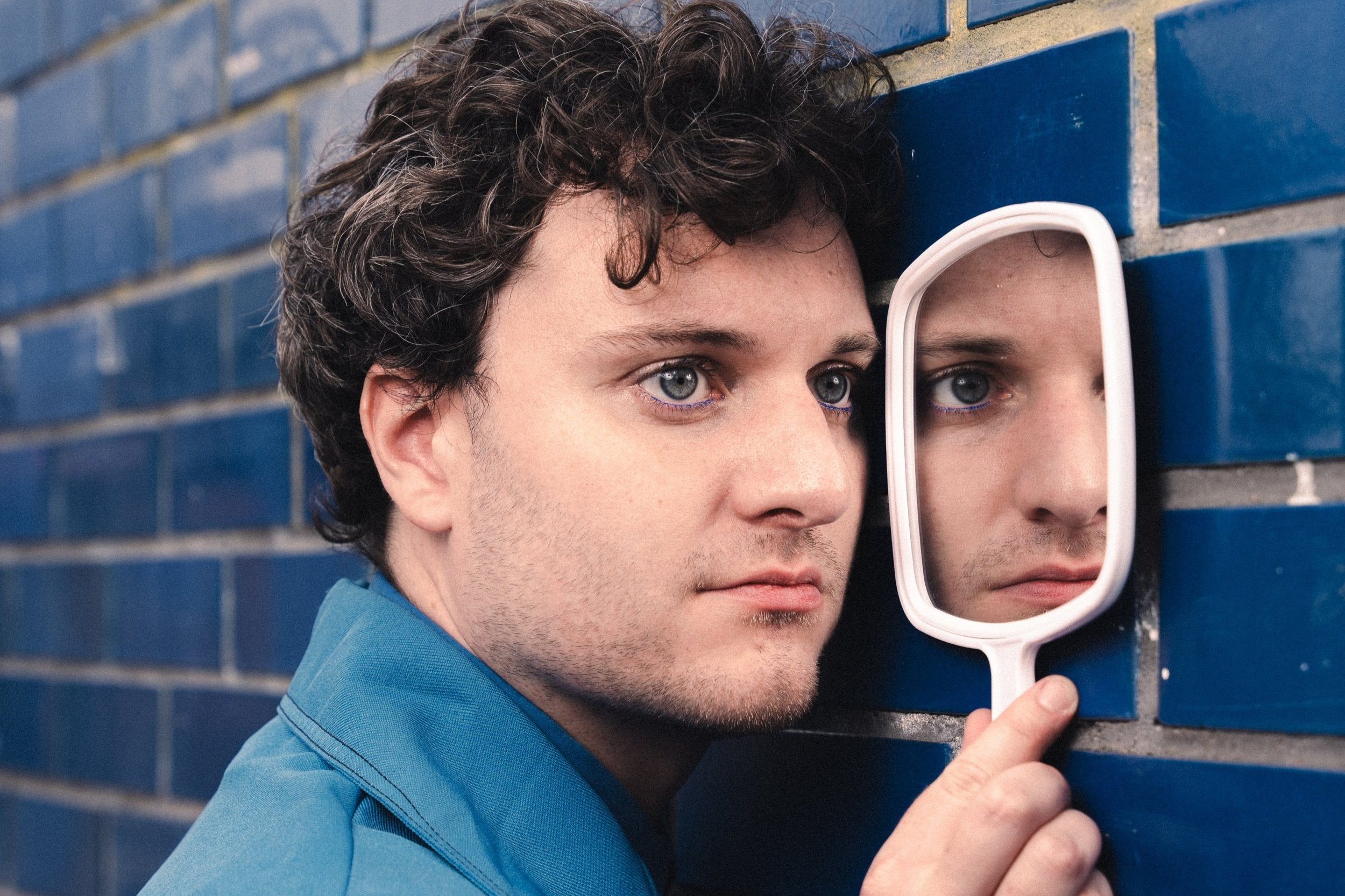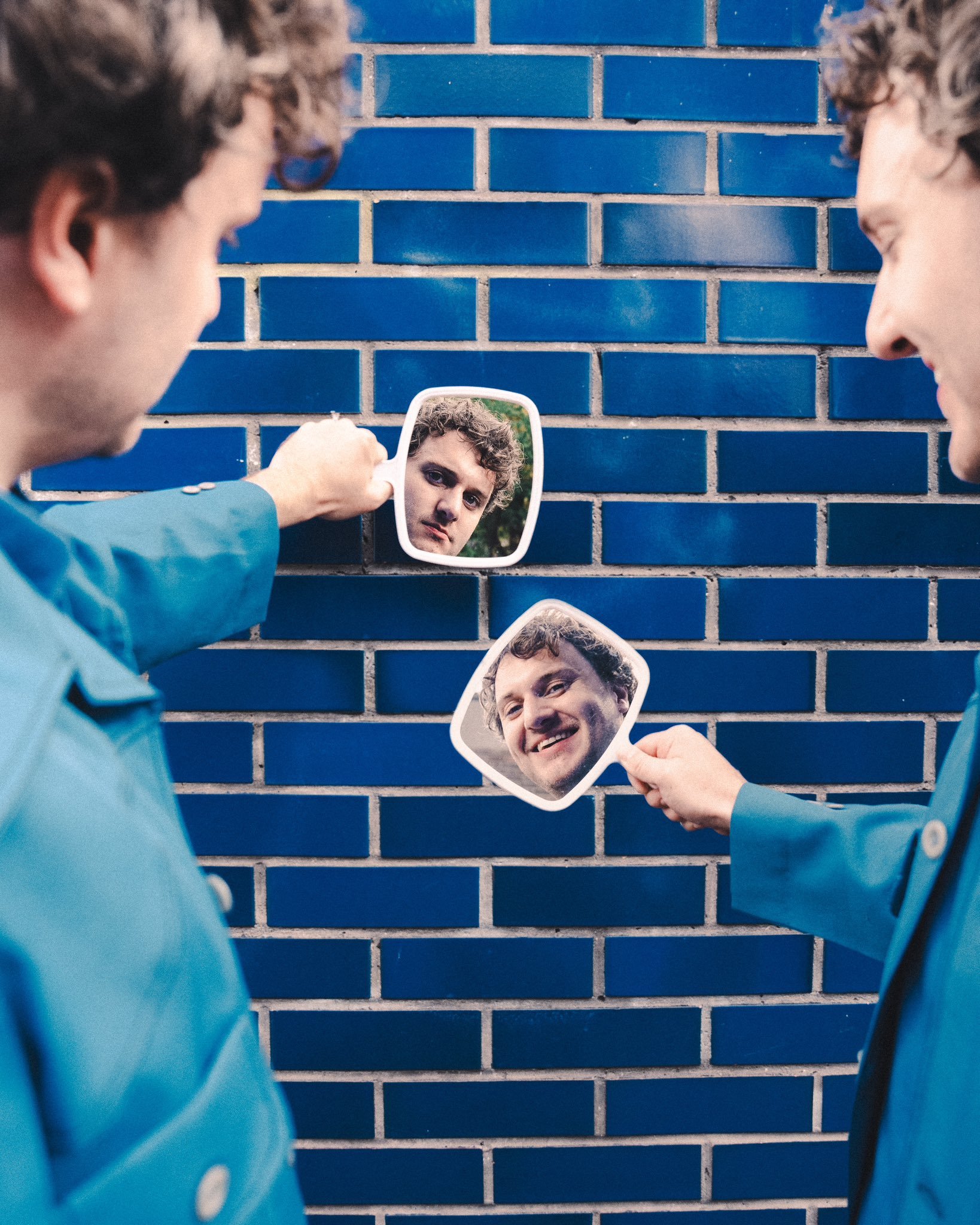One Way Mirror review: Jonathan Oldfield's luminous, thought-provoking show forces you to reflect
Image: Will Hearle Photography
Jonathan Oldfield’s One Way Mirror is a warm, funny storytelling show about his real experience living with a one way mirror as his front room window. In her review, Zoe Paskett writes about the reflection this show creates in its audience, the impact of constantly observing others and a strange sort of collective catharsis.
I’ve realised recently that I can’t stop looking into public reflective surfaces. It’s not a vanity thing, I promise, but I’ve developed a low-lying feeling that I’ve always got something on my face that shouldn’t be there. It may have stemmed from getting high-maintenance bangs, or maybe just eating a lot of tomato-based foods, but it’s caused me to pay undue attention to mirrors and windows.
Now, I’m going to be haunted by the feeling that someone is looking back at me. If that is to be the case, I hope it’s someone like Jonathan Oldfield.
One Way Mirror is based on his experience living behind a one way mirror in a former solicitor’s office guardianship, counting down the days until he was turfed out in favour of luxury student accommodation. During that time, which coincided with the height of the pandemic, he spent his time observing the outside world, unseen, vowing early on that he would never once intervene.
Jonathan’s warmth, his comfort on stage and intricate, funny storytelling style make this a compelling experience, but the crucially unique aspect is the way in which the audience participation takes place. A series of mirrors hang, oscillating from the ceiling, and one large, semi-transparent window takes centre stage, from behind which he recounts three moments he watched. The mirrors are more than set dressing; they reflect the audience back to ourselves, slowly rotating to take in more faces.
These three vignettes mark the pillars of the show, and the audience is granted the ability to overturn or uphold his decision to stay disconnected from the lives he observes. The show culminates in us reaping the rewards of those three decisions. Jonathan’s command of this form is masterful, allowing for everyone’s comfort level with audience interaction and resulting in relaxed laughter from all corners of the room and an extremely meaningful finale.
I have spent the last couple of days thinking not only about the story of his life behind that mirror, but my response to the situations he presents. Why did I pick that option? How would I have behaved if it were in front of me in real life and not on a stage? Why am I thinking about this so much?
The answer to this last question is sewn into the fabric of One Way Mirror. In the same way that watching people on his street fostered in Jonathan a sense of introspection, watching this show creates the same reaction in us.
It’s something I think about a lot in my line of work, spent viewing and analysing other people’s shows. I have learnt to ration it (as much as is possible when this is what I do), or at least temper it with actual human interaction, because constantly watching other people and staying out of it can take its toll on your sense of self.
The impact of excusing yourself from the world, whether by choice or circumstance, weighs heavily and grows over time. The show is constantly wrestling with the challenge of these two states: taking a step back and looking at the world, without imposing yourself on it, vs the absolute obligation to intervene. Sometimes removing ourselves and observing can allow us to see things more clearly, to have space and time to process and understand. And sometimes involving ourselves in other people brings healing and unexpected light.
It’s absolutely the introvert’s dilemma and while, at first, the mirror is a fascination for Jonathan (who explains what it means to be an extroverted introvert in the best way I’ve ever heard, and made me whisper “yesss exactly” to myself under my breath), it becomes in many ways his bane.
It’s not surprising really that a show about reflection has led to this endless ramble. I will jump on any opportunity for introspection, possibly in a way that’s not especially healthy, but it feels unavoidable in this case. There are layers upon layers to One Way Mirror that make it confusing and knotty in such a beautiful way. Not the storytelling itself — that is crystalline in its transparency — but within its wider context.
The pandemic was a turning point in how individuals interacted with the world. It was a loss of connection, and a revitalisation of the need for community. It was a wakeup call to those together that there were many of us alone, and that we had a collective responsibility for each other's lives. Much of this has now been swept away in the desperation to move on — to walk past the window and stop looking. To wipe away the tears and pretend no one else is crying either.
But what One Way Mirror brings, as we approach four years since this all began, is a necessary scar. A reminder that separation from the world never can and never should be permanent. As Jonathan sat watching the processing of joy, pain, love and tragedy outside his window, unseen, we also did this in some way during isolation. Jonathan invites us into a life, grants us access and intimacy, but now, we are all seen. It’s like we’re collectively healing the loop.
Much like a mirror reflecting ourselves back, the experience of this show will be intensely personal to each individual viewer (hence why I’ve managed to bang on about it for this long). One Way Mirror is the perfect example of why artwork that refuses to be boxed away is so successful. Is it theatre or is it comedy? Is it about him or us, or the couple in the chicken shop across the road, or the bin man? Who cares? The genre is human connection. While that might sound (and be) trite or pretentious, there’s no doubt that there’s something for everyone here. As long as you’re prepared to be seen.
Editor’s note on her own review:
I really wanted that to be the last line, but on reading this again, I felt the need to add some adjectives to the indulgent self-reflection. Wonderful. Glorious. Luminous. Thought-provoking (yeah, no shit).
We are creating a new print newspaper! If you want to read more things like this on a real page, pre-order yours now by clicking below.


